- Home
- Brandon Sanderson
Words of Radiance Page 12
Words of Radiance Read online
Page 12
So he’s spoiled and cocky, Kaladin thought.
“No,” Dalinar said. “Sadeas won’t accept a personal challenge, though eventually bringing him down is our goal. We start with some of the lesser Shardbearers and work up.”
The others in the room seemed troubled. That included Brightness Navani, who drew her lips to a line and glanced at Adolin. She might be in on Dalinar’s plan, but she didn’t love the idea of her nephew dueling.
She didn’t say so. “As Dalinar indicated,” Navani said, “this won’t be our entire plan. Hopefully, Adolin’s duels won’t need to go far. They are meant mostly to inspire worry and fear, to apply pressure to some factions who are working against us. The greater part of what we must do will entail a complex and determined political effort to connect with those who can be swayed to our side.”
“Navani and I will work to persuade the highprinces of the advantages of a truly unified Alethkar,” Dalinar said, nodding. “Though the Storm-father knows, I’m less certain of my political acumen than Adolin is of his dueling. It is what must be. If Adolin is to be the stick, I must be the feather.”
“There will be assassins, Uncle,” Elhokar said, sounding tired. “I don’t think Khal is right; I don’t think Alethkar will shatter immediately. The highprinces have come to like the idea of being one kingdom. But they also like their sport, their fun, their gemhearts. So they will send assassins. Quietly, at first, and probably not directly at you or me. Our families. Sadeas and the others will try to hurt us, make us back down. Are you willing to risk your sons on this? How about my mother?”
“Yes, you are right,” Dalinar said. “I hadn’t . . . but yes. That is how they think.” He sounded regretful to Kaladin.
“And you’re still willing to go through with this plan?” the king asked.
“I have no choice,” Dalinar said, turning away, walking back toward the window. Looking out westward, in toward the continent.
“Then at least tell me this,” Elhokar said. “What is your endgame, Uncle? What is it you want out of all of this? In a year, if we survive this fiasco, what do you want us to be?”
Dalinar put his hands on the thick stone windowsill. He stared out, as if at something he could see and the rest of them could not. “I’ll have us be what we were before, son. A kingdom that can stand through storms, a kingdom that is a light and not a darkness. I will have a truly unified Alethkar, with highprinces who are loyal and just. I’ll have more than that.” He tapped the windowsill. “I’m going to refound the Knights Radiant.”
Kaladin nearly dropped his spear in shock. Fortunately, nobody was watching him—they were leaping to their feet, staring at Dalinar.
“The Radiants?” Brightness Teshav demanded. “Are you mad? You’re going to try to rebuild a sect of traitors who gave us over to the Voidbringers?”
“The rest of this sounds good, Father,” Adolin said, stepping forward. “I know you think about the Radiants a lot, but you see them . . . differently than everyone else. It won’t go well if you announce that you want to emulate them.”
The king just groaned, burying his face in his hands.
“People are wrong about them,” Dalinar said. “And even if they are not, the original Radiants—the ones instituted by the Heralds—are something even the Vorin church admits were once moral and just. We’ll need to remind people that the Knights Radiant, as an order, stood for something grand. If they hadn’t, then they wouldn’t have been able to ‘fall’ as the stories claim they did.”
“But why?” Elhokar asked. “What is the point?”
“It is what I must do.” Dalinar hesitated. “I’m not completely certain why, yet. Only that I’ve been instructed to do it. As a protection, and a preparation, for what is coming. A storm of some sort. Perhaps it is as simple as the other highprinces turning against us. I doubt that, but perhaps.”
“Father,” Adolin said, hand on Dalinar’s arm. “This is all well and good, and maybe you can change people’s perception of the Radiants, but . . . Ishar’s soul, Father! They could do things we cannot. Simply naming someone a Radiant won’t give them fanciful powers, like in the stories.”
“The Radiants were about more than what they could do,” Dalinar said. “They were about an ideal. The kind of ideal we’re lacking, these days. We may not be able to reach for the ancient Surgebindings—the powers they had—but we can seek to emulate the Radiants in other ways. I am set on this. Do not try to dissuade me.”
The others did not seem convinced.
Kaladin narrowed his eyes. So did Dalinar know about Kaladin’s powers, or didn’t he? The meeting moved on to more mundane topics, such as how to maneuver Shardbearers into facing Adolin and how to step up patrols of the surrounding area. Dalinar considered making the warcamps safe to be a prerequisite for what he was attempting.
When the meeting finally ended, most people inside departing to carry out orders, Kaladin was still considering what Dalinar had said about the Radiants. The man hadn’t realized it, but he’d been very accurate. The Knights Radiant did have ideals—and they’d called them that very thing. The Five Ideals, the Immortal Words.
Life before death, Kaladin thought, playing with a sphere he’d pulled from his pocket, strength before weakness, journey before destination. Those Words made up the First Ideal in its entirety. He had only an inkling of what it meant, but his ignorance hadn’t stopped him from figuring out the Second Ideal of the Windrunners, the oath to protect those who could not protect themselves.
Syl wouldn’t tell him the other three. She said he would know them when he needed to. Or he wouldn’t, and would not progress.
Did he want to progress? To become what? A member of the Knights Radiant? Kaladin hadn’t asked for someone else’s ideals to rule his life. He’d just wanted to survive. Now, somehow, he was headed straight down a path that no man had trod in centuries. Potentially becoming something that people across Roshar would hate or revere. So much attention . . .
“Soldier?” Dalinar asked, stopping by the door.
“Sir.” Kaladin stood up straight again and saluted. It felt good to do that, to stand at attention, to find a place. He wasn’t certain if it was the good feeling of remembering a life he’d once loved, or if it was the pathetic feeling of an axehound finding its leash again.
“My nephew was right,” Dalinar said, watching the king retreat down the hallway. “The others might try to hurt my family. It’s how they think. I’m going to need guard details on Navani and my sons at all times. Your best men.”
“I’ve got about two dozen of those, sir,” Kaladin said. “That’s not enough for full guard details running all day protecting all four of you. I should have more men trained before too long, but putting a spear in the hands of a bridgeman does not make him a soldier, let alone a good bodyguard.”
Dalinar nodded, looking troubled. He rubbed his chin.
“Sir?”
“Your force isn’t the only one stretched thin in this warcamp, soldier,” Dalinar said. “I lost a lot of men to Sadeas’s betrayal. Very good men. Now I have a deadline. Just over sixty days . . .”
Kaladin felt a chill. The highprince was taking the number found scrawled on his wall very seriously.
“Captain,” Dalinar said softly, “I need every able-bodied man I can get. I need to be training them, rebuilding my army, preparing for the storm. I need them assaulting plateaus, clashing with the Parshendi, to get battle experience.”
What did this have to do with him? “You promised that my men wouldn’t be required to fight on plateau runs.”
“I’ll keep that promise,” Dalinar said. “But there are two hundred and fifty soldiers in the King’s Guard. They include some of my last remaining battle-ready officers, and I will need to put them in charge of new recruits.”
“I’m not just going to have to watch over your family, am I?” Kaladin asked, feeling a new weight settling in his shoulders. “You’re implying you want to turn over guarding the king t
o me as well.”
“Yes,” Dalinar said. “Slowly, but yes. I need those soldiers. Beyond that, maintaining two separate guard forces seems like a mistake to me. I feel that your men, considering your background, are the least likely to include spies for my enemies. You should know that a while back, there may have been an attempt on the king’s life. I still haven’t figured out who was behind it, but I worry that some of his guards may have been involved.”
Kaladin took a deep breath. “What happened?”
“Elhokar and I hunted a chasmfiend,” Dalinar said. “During that hunt, at a time of stress, the king’s Plate came close to failing. We found that many of the gemstones powering it had likely been replaced with ones that were flawed, making them crack under stress.”
“I don’t know much of Plate, sir,” Kaladin said. “Could they have just broken on their own, without sabotage?”
“Possible, but unlikely. I want your men to take shifts guarding the palace and the king, alternating with some of the King’s Guard, to get you familiar with him and the palace. It might also help your men learn from the more experienced guards. At the same time, I’m going to start siphoning off the officers from his guard to train soldiers in my army.
“Over the next few weeks, we’ll merge your group and the King’s Guard into one. You’ll be in charge. Once you’ve trained bridgemen from those other crews well enough, we’ll replace soldiers in the guard with your men, and move the soldiers to my army.” He looked Kaladin in the eyes. “Can you do this, soldier?”
“Yes, sir,” Kaladin said, though part of him was panicking. “I can.”
“Good.”
“Sir, a suggestion. You’ve said you’re going to expand patrols outside the warcamps, trying to police the hills around the Shattered Plains?”
“Yes. The number of bandits out there is embarrassing. This is Alethi land now. It needs to follow Alethi laws.”
“I have a thousand men I need to train,” Kaladin said. “If I could patrol them out there, it might help them feel like soldiers. I could use a large enough force that it sends a message to the bandits, maybe making them withdraw—but my men won’t need to see much combat.”
“Good. General Khal had been in command of patrol duty, but he’s now my most senior commander, and will be needed for other things. Train your men. Our goal will eventually be to have your thousand doing real roadway patrols between here, Alethkar, and the ports to the south and east. I’ll want scouting teams, watching for signs of bandit camps and searching out caravans that have been attacked. I need numbers on how much activity is out there, and just how dangerous it is.”
“I’ll see to it personally, sir.”
Storms. How was he going to do all of this?
“Good,” Dalinar said.
Dalinar walked from the chamber, clasping his hands behind him, as if lost in thought. Moash, Eth, and Mart fell in after him, as ordered by Kaladin. He’d have two men with Dalinar at all times, three if he could manage it. He’d once hoped to expand that to four or five, but storms, with so many to watch over now, that was going to be impossible.
Who is this man? Kaladin thought, watching Dalinar’s retreating form. He ran a good camp. You could judge a man—and Kaladin did—by the men who followed him.
But a tyrant could have a good camp with disciplined soldiers. This man, Dalinar Kholin, had helped unite Alethkar—and had done so by wading through blood. Now . . . now he spoke like a king, even when the king himself was in the room.
He wants to rebuild the Knights Radiant, Kaladin thought. That wasn’t something Dalinar Kholin could accomplish through simple force of will.
Unless he had help.
We had never considered that there might be Parshendi spies hiding among our slaves. This is something else I should have seen.
—From the journal of Navani Kholin, Jesesan 1174
Shallan sat again on her box on the ship’s deck, though she now wore a hat on her head, a coat over her dress, and a glove on her freehand—her safehand was, of course, pinned inside its sleeve.
The chill out here on the open ocean was something unreal. The captain said that far to the south, the ocean itself actually froze. That sounded incredible; she’d like to see it. She’d occasionally seen snow and ice in Jah Keved, during the odd winter. But an entire ocean of it? Amazing.
She wrote with gloved fingers as she observed the spren she’d named Pattern. At the moment, he had lifted himself up off the surface of the deck, forming a ball of swirling blackness—infinite lines that twisted in ways she could never have captured on the flat page. Instead, she wrote descriptions supplemented with sketches.
“Food . . .” Pattern said. The sound had a buzzing quality and he vibrated when he spoke.
“Yes,” Shallan said. “We eat it.” She selected a small limafruit from the bowl beside her and placed it in her mouth, then chewed and swallowed.
“Eat,” Pattern said. “You . . . make it . . . into you.”
“Yes! Exactly.”
He dropped down, the darkness vanishing as he entered the wooden deck of the ship. Once again, he became part of the material—making the wood ripple as if it were water. He slid across the floor, then moved up the box beside her to the bowl of small green fruits. Here, he moved across them, each fruit’s rind puckering and rising with the shape of his pattern.
“Terrible!” he said, the sound vibrating up from the bowl.
“Terrible?”
“Destruction!”
“What? No, it’s how we survive. Everything needs to eat.”
“Terrible destruction to eat!” He sounded aghast. He retreated from the bowl to the deck.
Pattern connects increasingly complex thoughts, Shallan wrote. Abstractions come easily to him. Early, he asked me the questions “Why? Why you? Why be?” I interpreted this as asking me my purpose. When I replied, “To find truth,” he easily seemed to grasp my meaning. And yet, some simple realities—such as why people would need to eat—completely escape him. It—
She stopped writing as the paper puckered and rose, Pattern appearing on the sheet itself, his tiny ridges lifting the letters she had just penned.
“Why this?” he asked.
“To remember.”
“Remember,” he said, trying the word.
“It means . . .” Stormfather. How did she explain memory? “It means to be able to know what you did in the past. In other moments, ones that happened days ago.”
“Remember,” he said. “I . . . cannot . . . remember . . .”
“What is the first thing you do remember?” Shallan asked. “Where were you first?”
“First,” Pattern said. “With you.”
“On the ship?” Shallan said, writing.
“No. Green. Food. Food not eaten.”
“Plants?” Shallan asked.
“Yes. Many plants.” He vibrated, and she thought she could hear in that vibration the blowing of wind through branches. Shallan breathed in. She could almost see it. The deck in front of her changing to a dirt path, her box becoming a stone bench. Faintly. Not really there, but almost. Her father’s gardens. Pattern on the ground, drawn in the dust . . .
“Remember,” Pattern said, voice like a whisper.
No, Shallan thought, horrified. NO!
The image vanished. It hadn’t really been there in the first place, had it? She raised her safehand to her breast, breathing in and out in sharp gasps. No.
“Hey, young miss!” Yalb said from behind. “Tell the new kid here what happened in Kharbranth!”
Shallan turned, heart still racing, to see Yalb walking over with the “new kid,” a six-foot-tall hulk of a man who was at least five years Yalb’s senior. They’d picked him up at Amydlatn, the last port. Tozbek wanted to be sure they wouldn’t be undermanned during the last leg to New Natanan.
Yalb squatted down beside her stool. In the face of the chill, he’d acquiesced to wearing a shirt with ragged sleeves and a kind of headband that wrapp
ed over his ears.
“Brightness?” Yalb asked. “You all right? You look like you swallowed a turtle. And not just the head, neither.”
“I’m well,” Shallan said. “What . . . what was it you wanted of me, again?”
“In Kharbranth,” Yalb said, thumbing over his shoulder. “Did we or did we not meet the king?”
“We?” Shallan asked. “I met him.”
“And I was your retinue.”
“You were waiting outside.”
“Doesn’t matter none,” Yalb said. “I was your footman for that meeting, eh?”
Footman? He’d led her up to the palace as a favor. “I . . . guess,” she said. “You did have a nice bow, as I recall.”
“See,” Yalb said, standing and confronting the much larger man. “I mentioned the bow, didn’t I?”
The “new kid” rumbled his agreement.
“So get to washing those dishes,” Yalb said. He got a scowl in response. “Now, don’t give me that,” Yalb said. “I told you, galley duty is something the captain watches closely. If you want to fit in around here, you do it well, and do some extra. It will put you ahead with the captain and the rest of the men. I’m giving you quite the opportunity here, and I’ll have you appreciate it.”
That seemed to placate the larger man, who turned around and went tromping toward the lower decks.
“Passions!” Yalb said. “That fellow is as dun as two spheres made of mud. I worry about him. Somebody’s going to take advantage of him, Brightness.”
“Yalb, have you been boasting again?” Shallan said.
“’Tain’t boasting if some of it’s true.”
“Actually, that’s exactly what boasting entails.”
“Hey,” Yalb said, turning toward her. “What were you doing before? You know, with the colors?”
“Colors?” Shallan said, suddenly cold.
“Yeah, the deck turned green, eh?” Yalb said. “I swear I saw it. Has to do with that strange spren, does it?”
“I . . . I’m trying to determine exactly what kind of spren it is,” Shallan said, keeping her voice even. “It’s a scholarly matter.”

 Steelheart
Steelheart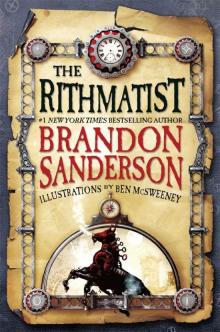 The Rithmatist
The Rithmatist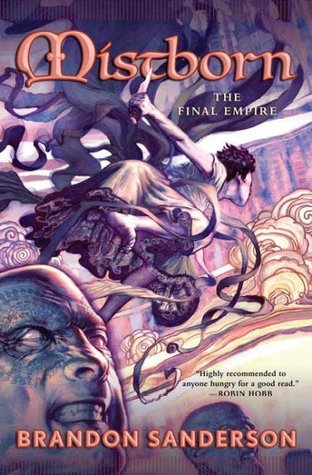 Mistborn: The Final Empire
Mistborn: The Final Empire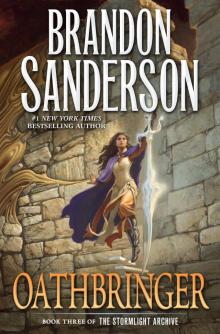 Oathbringer
Oathbringer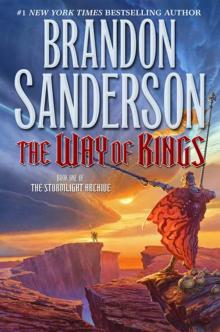 The Way of Kings
The Way of Kings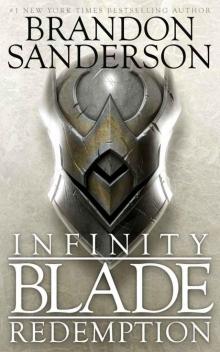 Redemption
Redemption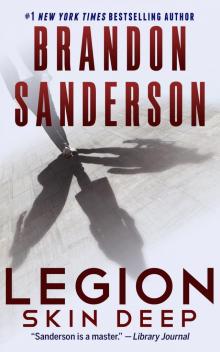 Skin Deep
Skin Deep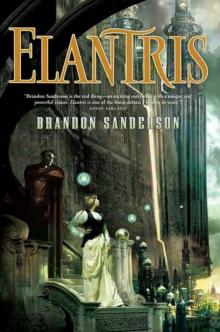 Elantris
Elantris Snapshot
Snapshot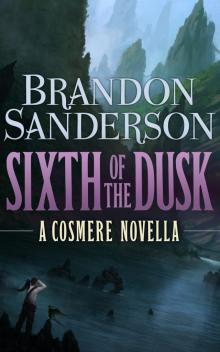 Sixth of the Dusk (Cosmere)
Sixth of the Dusk (Cosmere)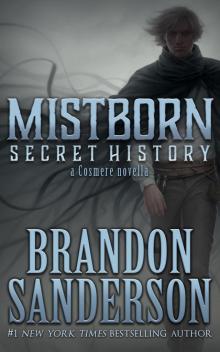 Mistborn: Secret History
Mistborn: Secret History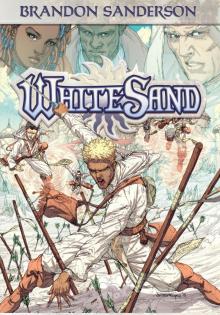 White Sand, Volume 1
White Sand, Volume 1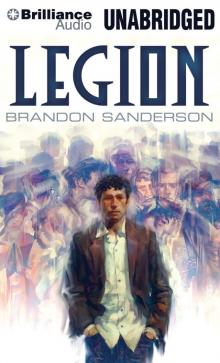 Legion
Legion The Well of Ascension
The Well of Ascension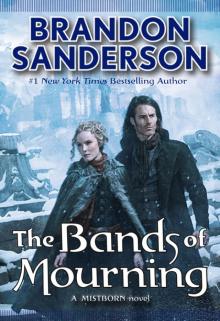 The Bands of Mourning
The Bands of Mourning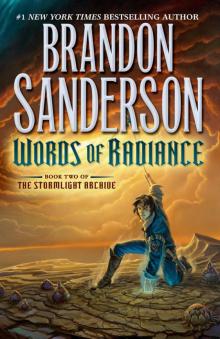 Words of Radiance
Words of Radiance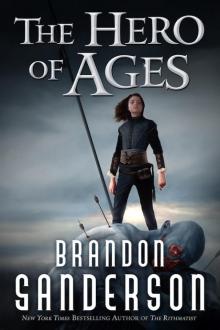 The Hero of Ages
The Hero of Ages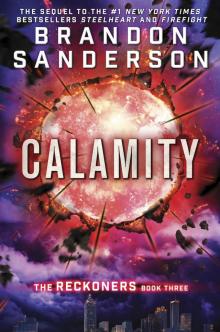 Calamity
Calamity Alcatraz Versus the Scrivener's Bones
Alcatraz Versus the Scrivener's Bones The Alloy of Law
The Alloy of Law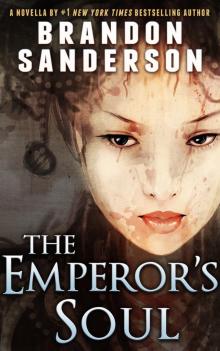 The Emperors Soul
The Emperors Soul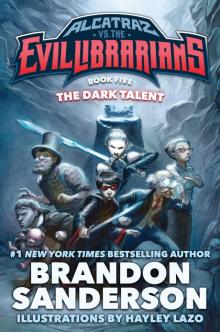 The Dark Talent
The Dark Talent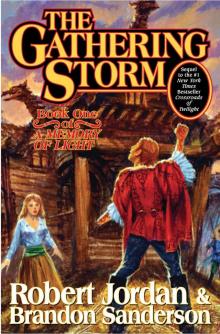 The Gathering Storm
The Gathering Storm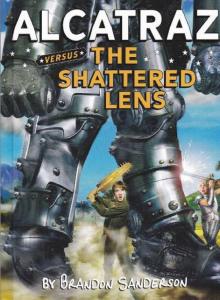 Alcatraz Versus the Shattered Lens
Alcatraz Versus the Shattered Lens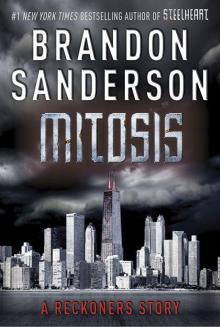 Mitosis
Mitosis Alcatraz vs. The Evil Librarians
Alcatraz vs. The Evil Librarians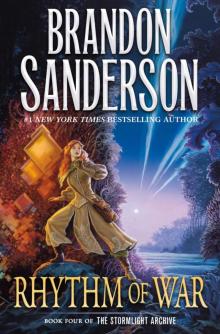 Rhythm of War (9781429952040)
Rhythm of War (9781429952040)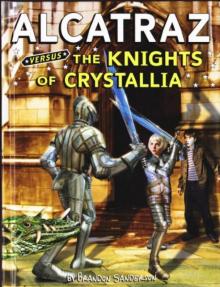 Alcatraz Versus the Knights of Crystallia
Alcatraz Versus the Knights of Crystallia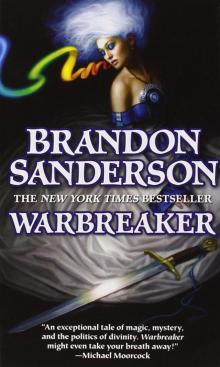 Warbreaker
Warbreaker Firstborn
Firstborn Starsight
Starsight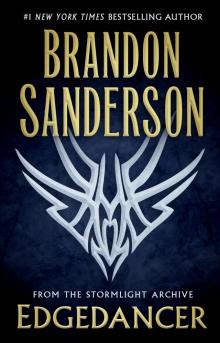 Edgedancer
Edgedancer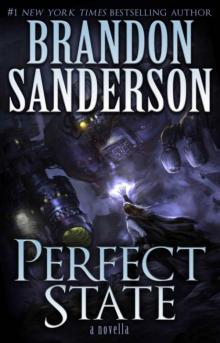 Perfect State
Perfect State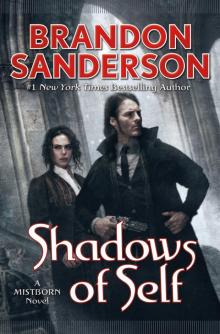 Shadows of Self
Shadows of Self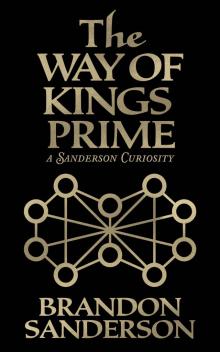 The Way of Kings Prime
The Way of Kings Prime Starsight (US)
Starsight (US) Shadows for Silence in the Forests of Hell
Shadows for Silence in the Forests of Hell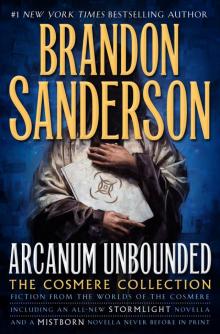 Arcanum Unbounded: The Cosmere Collection
Arcanum Unbounded: The Cosmere Collection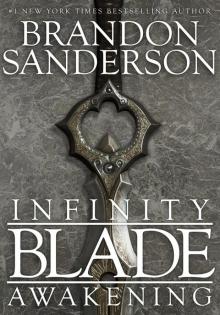 Awakening
Awakening Firefight
Firefight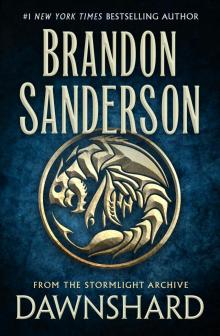 Dawnshard
Dawnshard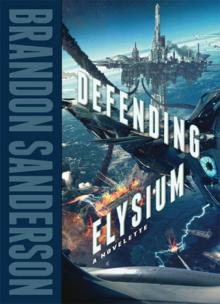 Defending Elysium
Defending Elysium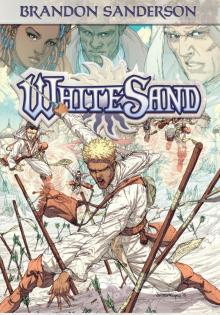 White Sand
White Sand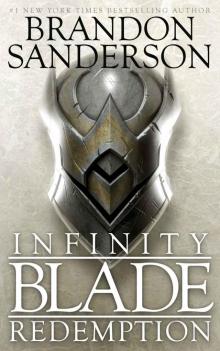 Infinity Blade: Redemption
Infinity Blade: Redemption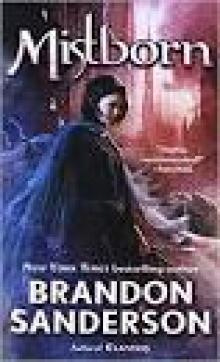 The Final Empire
The Final Empire Skyward
Skyward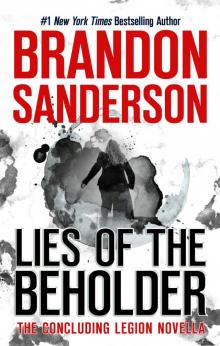 Lies of the Beholder
Lies of the Beholder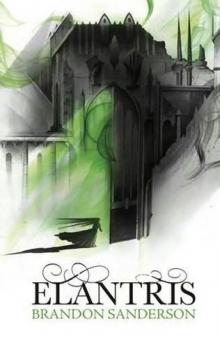 Elantris e-1
Elantris e-1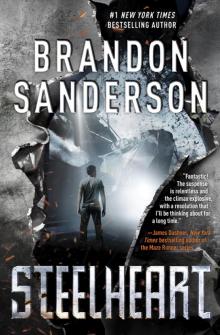 Steelheart r-1
Steelheart r-1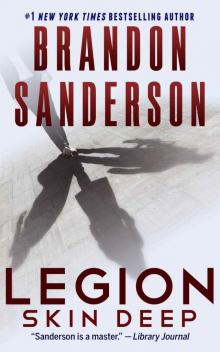 Legion: Skin Deep
Legion: Skin Deep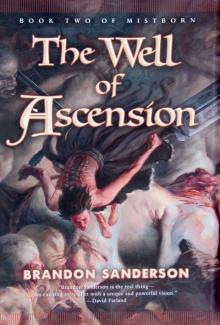 Well of Ascension
Well of Ascension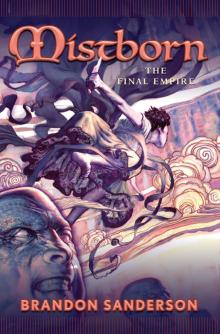 Mistborn
Mistborn Alcatraz versus the Evil Librarians
Alcatraz versus the Evil Librarians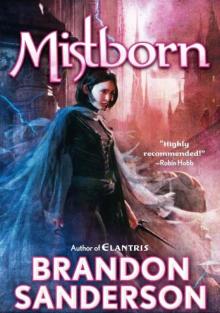 The Final Empire m-1
The Final Empire m-1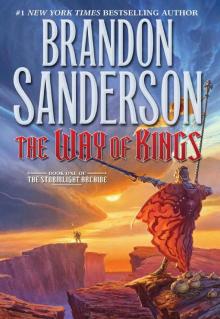 The Way of Kings (Stormlight Archive, The)
The Way of Kings (Stormlight Archive, The)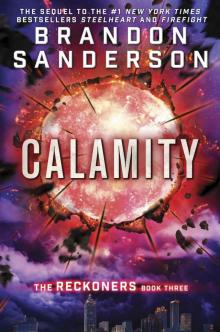 Calamity (The Reckoners)
Calamity (The Reckoners)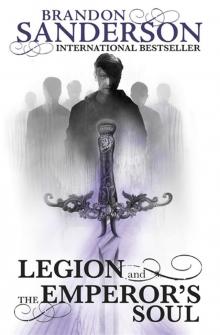 Legion and the Emperor's Soul
Legion and the Emperor's Soul Legion: The Many Lives of Stephen Leeds
Legion: The Many Lives of Stephen Leeds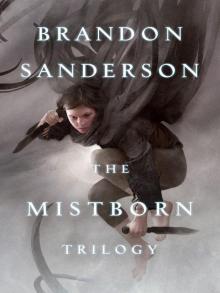 The Mistborn Trilogy
The Mistborn Trilogy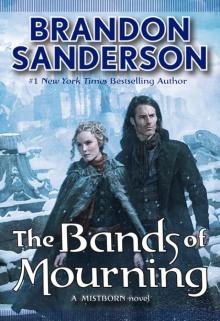 Bands of Mourning
Bands of Mourning Alcatraz
Alcatraz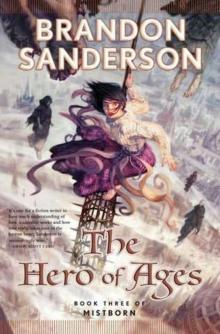 The Hero of Ages m-3
The Hero of Ages m-3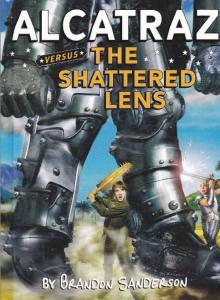 Alcatraz vs. the Shattered Lens
Alcatraz vs. the Shattered Lens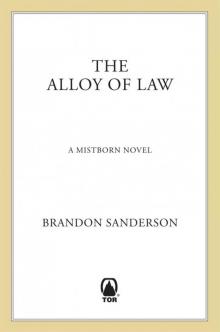 The Alloy of Law: A Mistborn Novel
The Alloy of Law: A Mistborn Novel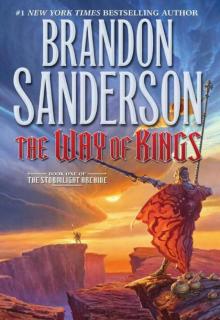 The Way of Kings sa-1
The Way of Kings sa-1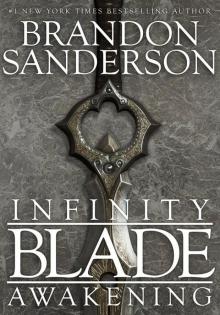 Infinity Blade: Awakening
Infinity Blade: Awakening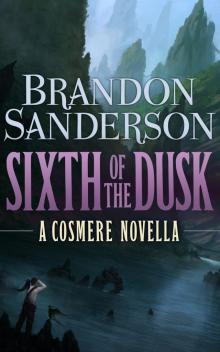 Sixth of the Dusk
Sixth of the Dusk The Stormlight Archive
The Stormlight Archive The Aether of Night
The Aether of Night